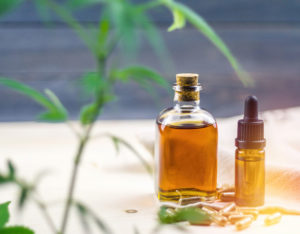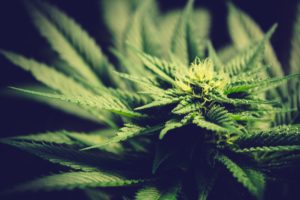Getting older happens. And although the second half of our lives can be extremely rewarding, it also comes with its own set of issues. As time ticks by, we start experiencing a loss of vitality, little aches and pains become more persistent and pronounced, and for some, more serious health concerns become a reality.
Many older adults require prescription medications; others are taking over-the counter medicines, vitamins and other supplements to find relief from a variety of health concerns. But, with cannabidiol (CBD) getting federal legalization across the U.S., there are a growing number of seniors turning to this non-psychoactive cannabinoid to find relief.
According to a recent study by Remedy Review, 9 percent of seniors 54 and older have tried CBD for health reasons. Of those who have tried it, 51 percent said their quality of life improved, and 89 percent reported that they would recommend it to a family member or friend. The same study found that the most common health complaints spurring seniors to use CBD was for issues relating to inflammation, chronic pain, poor sleep, arthritis and anxiety with 78 percent of CBD users saying they were very satisfied with the results.
So let’s take a look at CBD usage and the associated benefits and side effects for health-related issues older adults commonly have to deal with.
CBD for Chronic Neuropathic and Inflammatory Pain
Chronic pain is roughly grouped into two categories: neuropathic and inflammatory pain. Neuropathic pain is largely caused by the release of a neurotransmitter called glutamate. Glutamate is responsible for activating neurons in the glutamenergic system, a major excitatory neuronal pathway, which cause sensations of pain.
One of the main reasons seniors experience pain relief when using CBD is because of its potential to suppress α3 GlyRs receptors, the main mechanism responsible for chronic pain. In addition, CBD may also restore the balance of endocannabinoids such as anandamide and FAAH, which are thought to play a role in blocking pain signals. Moreover, CBD activates the CB2 receptors, which suppress pain processing.
Inflammatory pain is similar to neuropathic pain but is caused by immune responses to things such as environmental stressors, toxins and infections. And unlike neuropathic pain, which is limited to neural pathways, inflammatory pain can present itself throughout the body.
As with neuropathic pain, CBD acts as an analgesic for inflammatory pain through its interaction with the glutamenergic system. However, CBD also has powerful anti-inflammatory properties, which makes it specifically suited to inflammatory pain. CBD has the ability to decrease the activity of the enzyme cyclooxygenase, inhibiting the release of prostaglandins, which is the main reason the body triggers an inflammatory response. CBD also has the added benefit of fighting inflammation and its associated oxidative stress by exerting an immunosuppressive effect on the cells that play a role in inflammation.
CBD for Dementia and Alzheimer’s Disease
Neurodegenerative disorders such as dementia and Alzheimer’s disease is thought to be associated with oxidative stress causing a loss of neurons in the brain and is believed to underlie the subsequent decline in cognitive and motor function these patients experience. In addition, scientists also implicate a range of mutant genes and environmental toxins, though the underlying mechanism is not completely known.
It’s important to understand that CBD cannot cure dementia or Alzheimer’s disease, but it may be able to help improve the health outcomes of these patients by:
- helping to reduce neuroinflammation (brain inflammation)
- working as a neuroprotectant (protects against neural damage)
- helping with neurogenesis (the process by which new neurons are formed in the brain)
- modulate the expression of Alzheimer’s Disease-related genes.
CBD for Bone Health
Erroneously associated with menopausal women, osteoporosis and low bone mineral density affects both men and women. According to the National Osteoporosis Foundation (NOF) half of all adults 50 and older are at risk of breaking a bone and should be concerned about bone health.
As we grow older, bone mineral density loss occurs silently and progressively, with bones becoming more porous and fragile over time. Scientists have found that a key contributor to a decline in bone density and health is related to an endocannabinoid deficiency in the CB2-receptors, which are present in osteoblasts, osteocytes, and osteoclasts that make up bone. Moreover, research has not only shown that CBD has the ability to target the receptors responsible for bone health, but that it may actually help enhance with the healing of fractures as well.
CBD for Sleep and Mood Conditions
Many seniors also have to deal with other types of lifestyle and psychological conditions ranging from difficulty with sleeping to anxiety and depression.
For example, many older adults report changes in their sleep patterns as part of the normal aging process. As people age they tend to have a harder time falling asleep and more trouble staying asleep than when they were younger. This often leaves them feeling tired during the day. CBD has been shown to help with sleep difficulties in a number of different ways.
Similarly, according to a Harvard Medical School report from 2019, generalized anxiety disorder is one of the most common mental illnesses affecting older adults, 60-plus. But, because older adults are more prone to the side effects of benzodiazepine medications—most typically prescribed for anxiety—it’s also very difficult to treat. CBD is a great alternative treatment option for anxiety without the side effects normally associated with prescription medications.
Although aging once evoked images of wheelchairs, old age homes and pillboxes filled to the brim with prescription drugs, CBD has the ability to change this perception. Thanks to this little cannabinoid, an increasing number of seniors are now experiencing improved quality of life, finding relief from a variety of symptoms: everything from chronic pain to sleep quality. And with CBD’s favorable safety and side-effect profile, for many seniors it may become increasingly appealing.
Aging adults everywhere can benefit from CBD oil. However, as with any other new treatment option, it is always best to speak to your treating physician or a medical professional before embarking on this journey.




